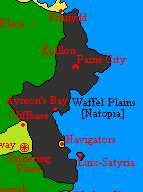Waffel Plains: Difference between revisions
No edit summary |
No edit summary |
||
| Line 54: | Line 54: | ||
[[category:Natopia]] | [[category:Natopia]] | ||
Revision as of 20:23, 24 April 2020
| Colony of Waffel Plains | |||
| |||
| Motto: | |||

| |||
| Map versions | 16.6.6 - present | ||
| Capital | Paine City | ||
| Largest city | Ayreon's Bay, Ludwig-Satyria | ||
| Official language(s) | Natspeak | ||
| Official religion(s) | n/a | ||
| Demonym | Waffelian | ||
| - Adjective | Waffelian | ||
| Government | SATCo-governed colony | ||
| - {{{headofstatetitle}}} | {{{headofstate}}} | ||
| - Governor | Bernard Kayyk | ||
| - Legislature | Board of Coordinators | ||
| Establishment | Grunil 23, 1678 | ||
| - Ranked | {{{agerank}}} | ||
| Area | |||
| Population | low | ||
| Abbreviation | WAF | ||
The Colony of Waffel Plains is a Natopian territory. It was explored and settled by the Golden Sunset Expedition.
The Need for a Colony
The settlement of Waffel Plains was first suggested around the time when the island of Mar Sara was transferred to Natopia from Shireroth in exchange for Leng. Prior to Natopian control over Mar Sara, the small demesnes of the Two Martyrs was Natopia's only possession in the area. Following the transfer of Leng, the territorial policy of Natopia began to favor consolidation. After the Kalirion Fracture and Elwynn independence, soon Normark began to agitate for a transfer to Elwynnese sovereignty. Natopia's new preference for consolidation was, in large part, thanks to its reliance and support of the Raspur Pact which allowed Natopia to use allied bases and ports instead of maintaining a globe-spanning empire that stretched logistical support to the limit.
With resources freed up following Normark's tranfer to Elwynn, the Natopian government chartered SATCo to survey and settle the nearest open land: the eastern shore of Cibola. The presense of Mar Sara and Two Martyrs made Cibola the next logical step for future territorial expansion and the unofficial position of Natopia's government has been to focus all future development on Cibola. The Golden Sunset Expedition formally embarked in early 1678 and settled the first towns of Waffel Plains in late 1678.
First Five Years
From 1678 to 1683 the colony grew considerably. Under the expert administration of Governor Bernard Kayyk and a team of SATCo coordinators, advisors, and engineers, the various industries of the colony flourished. Population increased as the agriculture, mining, and trade industries grew. Nearly all aspects of life in the colony were controlled, or monitored, by the Company.
Relations with Goetia
The close proximity of the Community of Goetia was an initial concern for the surveyors. Aside from a few brief skirmishes, relations between the colony and the demon-worshipers was eventually stabilized with a trade agreement. SATCo exports all manner of goods, food, and manufactured items to Goetia and imports raw marble and gold from the Gateway and Gladius groups via Gathering Place. Goetics retain the right to patrol their ancestral highways between Cliffbase, Navigators, and Gathering Place.
Population Growth
Initial counts of the colony's population estimated that 2.4 million residents had settled in the colony during the first 2 years. According to the colony's charter issued by the Frenzy, the Board of Coordinators must not only prove population growth and sustainability, but also promote diversity among the colony's residents. As a result, immigration ratios have been implemented on Natopian demesnes and Raspur-allied nations to prevent a monoculture from developing in the colony. Of the total applicants for residency over each 30 day period, no more than 10% of total applicants can be admitted from the same sub-national unit.
Projections estimate that by 1683, the population of Waffel Plains will be about 9.6 million. The Board of Coordinators has always requested the Frenzy charter more cities or fast-track the colony to be merged into the Demesnes of Mar Sara-Asara to form a single regional Cibolan demesne that can handle its own affairs without permission from the Frenzy.
Production Zones
Under the colony's charter, the territory of the colony is divided into three Production Zones, each headquartered in a city with a Coordinator to govern the zone.
Zone 1
Production Zone #1 is located in the north, and headquartered in the colonial seat: Paine City. It manages agriculture, plans crops cycling, exports foodstuffs, and regulates food distribution to the rest of the colony.
Zone 2
Production Zone #2 is located in the middle, headquartered in Ayreon's Bay. It is primarily focused on constructing and managing the silver mines further inland. The port of Ayreon's Bay is one of the most secure ports on the eastern seaboard of Cibola due to the high volume of silver exported daily.
Zone 3
Production Zone #3 is located in the south and headquartered in twin cities of Ludwig-Satyria. Ludwig is the smaller coastal twin of Satyria, on the island. Ludwig handles most of the direct affairs with the Goetics, shipping the raw gold and marble in small barges to Satyria. Ludwig allows for a buffer between the Goetics and the outside world. Satyria has been built up to be a trade hub for the entire colony and serves as a distribution node between the colony, Two Martyrs, Mar Asara, and Cape Isabella.